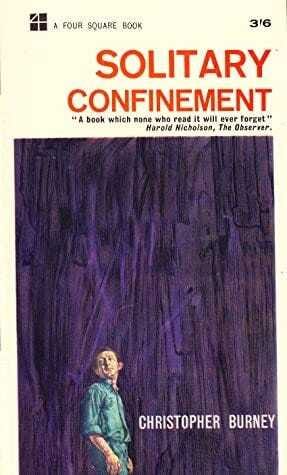A revolutionary once said: there is nothing to discuss with a person who has never endured solitary confinement.
From the blurb in The Observer:
“How would you behave if you were locked alone for a year and a half in a cell measuring ten by five feet, constantly plagued by cold and hunger, waking every morning with the dread that today might bring death or torture?”
For 526 days, Mr. Burney — arrested by the Gestapo as a British agent in France — remained imprisoned in solitary confinement. He chronicles his ordeal with almost clinical detachment, focusing on both his physical suffering and, more profoundly, his spiritual journey.
In his cell, Burney had nothing: no books, no writing materials, not even a scrap of paper. He subsisted on a daily bowl of watery soup and a small ration of bread — and even these meager provisions were sometimes withheld as punishment. His threadbare blankets offered little protection against the biting cold. At one point, guards confiscated even his thin mattress, forcing him to sleep directly on the stone floor.
Like many prisoners in isolation, Burney paced ceaselessly. At first, he believed that circling the cell would provide a greater “sense of freedom.” Eventually, he discovered that varying the rhythm of his steps — akin to shifting the meter of a musical composition — offered the greatest psychological relief.
Every fragment of memory became a priceless treasure: a few lines of poetry, the recollection of a fine meal, a proverb, a literary passage, or any meaningful remnant of his past. To exercise his mind, he set himself arbitrary challenges — such as enumerating all the counties of England and Scotland, or listing the states of America. He would imagine journeys between two cities, mentally constructing the people, landscapes, and encounters along the way.
On one occasion, a piece of bread was wrapped in the final pages of a book by Sir James Jeans concerning Planck’s constant. Although Burney had no prior interest in physics, after many days of intense concentration, he managed to grasp the student-level exposition of the argument.
Over time, Burney attained a higher state of contemplation. This was perhaps inevitable; great thinkers such as Socrates and Boethius also found inspiration in the shadow of execution. He engaged in detailed meditations on the great philosophical questions of existence: the paradoxes of free will, the nature of individual responsibility, the relationship between body and soul, and more — using only his mind as a guide, without teachers, without texts, and with only the long, silent hours of isolation as his canvas.
Through these reflections, Burney arrived at a profound theory, one strikingly close to that reached by Boethius in his prison cell in 523 AD. Just as light is an active force while darkness is merely its absence, Burney argued that good contains an active energy with which evil can never compete. He rejected the conventional notion of good and evil as polar opposites, proposing instead a continuum where only positive degrees of goodness possess meaning and effectiveness.
On one of his rare outings to the prison yard, Burney managed to smuggle a snail back into his cell. The creature not only provided companionship for a time but also served as a living reminder of the world beyond the prison walls. Burney vividly describes how extreme deprivation fosters extraordinary ingenuity — from inventing improvised games to devising elaborate exercise routines within the confines of his tiny cell.
He reimagined the very nature of time itself. In solitude, Burney found that traditional perceptions of time dissolved: minutes could stretch into what felt like hours, while entire days could vanish in an instant. To maintain his sanity, he created personal rituals and markers, a private calendar against the formlessness of isolation.
Deprived of external stimuli, his mind turned inward, building complex inner worlds and engaging in imagined dialogues. Burney examines in detail how the mind constructs defense mechanisms to ward off the abyss of emptiness.
He realized that survival depended on a delicate balance: maintaining a connection to the outside world while simultaneously learning to detach from it. Longing too fervently for freedom could lead to despair; surrendering too completely to captivity risked the loss of the self.
Ultimately, Burney concluded that the ability to engage in abstract thought was the decisive factor in surviving solitary confinement. Those with a practical, concrete mindset suffered more acutely than those who could immerse themselves in abstract reflection and inner exploration.
By the end of his incarceration, Christopher Burney had attained a state of inner peace he could scarcely have imagined at the outset. These long months of solitary confinement, he finally understood, had been an exercise in freedom.
His observations anticipated many later psychological studies on the effects of isolation and remain a vital source for understanding the profound impact of solitary confinement on the human psyche.
